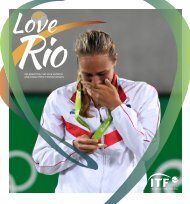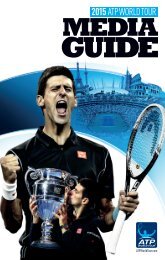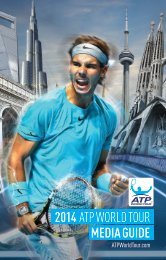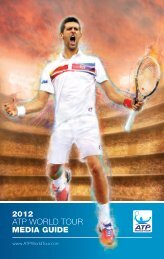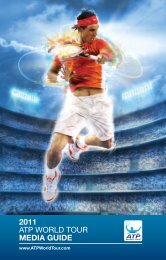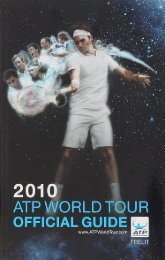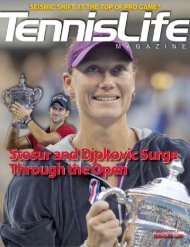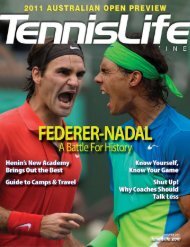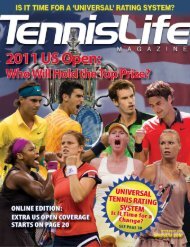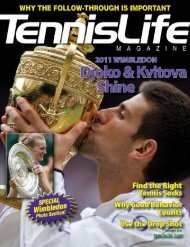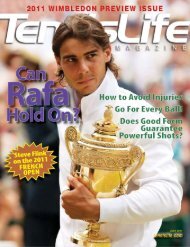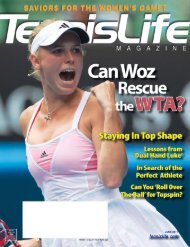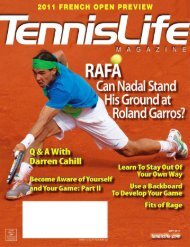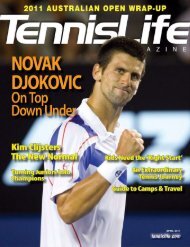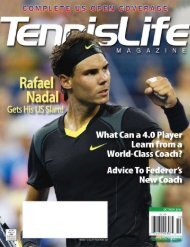A Champion's Mind - Pete Sampras
www.tennismoscow.me Insta:TENNISMOSCOW
www.tennismoscow.me Insta:TENNISMOSCOW
Create successful ePaper yourself
Turn your PDF publications into a flip-book with our unique Google optimized e-Paper software.
I was troubled in the winter of 1996, and a little dispirited, but I did win two indoor winter<br />
tournaments after my failed Australian campaign, San Jose and Memphis. In the former, I rolled through<br />
Andre 6–2 and 6–3. But after Memphis in ’96, it’s all a blur. Tim was dying; by then it was a matter of<br />
“when” not “if.” I sleepwalked through the big outdoor hard-court events in the States, and earned my<br />
appearance fees in Hong Kong and Tokyo by winning both—much to my own surprise.<br />
As the European clay-court season loomed, time was running out for Tim. Our system of Tim being the<br />
coach and Paul being the messenger had completely disintegrated, because it had gotten to the point where<br />
Tim had lost his capacity to think clearly. It became tough to talk with him—about anything. The process<br />
was heart-wrenching. Although my emotional state affected my play, it had nothing to do with Tim no<br />
longer being able to function as a coach. I was very comfortable with Paul Annacone by then, and felt my<br />
game and approach were in great shape.<br />
I visited Tim a number of times at his home in Chicago. The last time I saw him, just weeks before he<br />
died, was the hardest. He could barely hold himself erect in his wheelchair. His hair had fallen out, and<br />
he was all swollen up—basically, he was waiting to die. On our drive back to the airport, I sat in the<br />
backseat, while he was helped from his wheelchair into the front, beside the driver. Whenever the car<br />
made a turn, his body listed in the opposite direction; he had no strength left. When he talked to me, he had<br />
to move his whole body to face me. He struggled for words, remembering less and less. Everything that<br />
made Tim who he was just slowly and inexorably drained away. I remember getting on the plane and<br />
looking back, out the window, and seeing him there all by himself. I was alone, too. Slowly, tears started<br />
to roll down my cheeks.<br />
Tim died on May 3, 1996. It was the first time in my life that I’d lost someone who was like a family<br />
member; I had never even attended a funeral. Tom Gullikson asked me to speak at the memorial service,<br />
but I didn’t want to do it. I told Tom, “I don’t know what I’m going to be like at the funeral. I don’t want to<br />
break down again in public, and I don’t want to see this ceremony become about me, so I’m going to say<br />
no for now.” But when I was at the funeral, surrounded by so many of our shared friends and loved ones, I<br />
knew I had to speak. It was the right thing to do.<br />
I told a story about Tim’s extremism when it came to his hobbies and interests. He was always reading<br />
different books that had self-help or spiritual overtones; he read about fasting, the Tao, Zen, and stuff like<br />
that. So once when we were at my home in Tampa, Tim spontaneously declared that he was going to lose<br />
ten pounds in seven days. He had read about how to do it somewhere. So he went to the local GNC store<br />
and got this awful, dark green stuff that you were supposed to mix with water and drink. It looked like<br />
pond scum, some kind of algae or something—and this was a guy who was addicted to Diet Coke. From 7<br />
A.M. to 10 P.M. every day we were together for six years, Tim seemed to have a can of Coke in his hand.<br />
So Tim slammed back the pond scum. A few moments later, he got up and went into the other room. I<br />
figured he needed to make a phone call or something. But over the noise of the television in the living<br />
room I heard this awful noise and realized it was Tim, throwing up. I ran to the other room and there he<br />
was, slouched against the wall, white as a sheet, and still puking up this vile green stuff.<br />
Rome was coming up fast, but I needed time to mourn Tim, so I pulled out. I did enter the World Team<br />
Cup event just to get a little match play before the French Open, and I lost two matches: one to Bohdan<br />
Ulihrach, the other to Yevgeny Kafelnikov. So I went into the French Open without a single win in a claycourt<br />
match that year, while my rivals in Paris had battled their way through the entire European claycourt<br />
circuit, from Barcelona to Monte Carlo to Rome to Hamburg.<br />
When the draw came out for Roland Garros, I just looked at it and went, “Wow.” It was as tough as it<br />
could get. On form, I would play two recent French Open champs, starting in the second round with twotime<br />
winner Sergi Bruguera. It was time to step up; I knew that’s what Tim would have wanted me to do.



